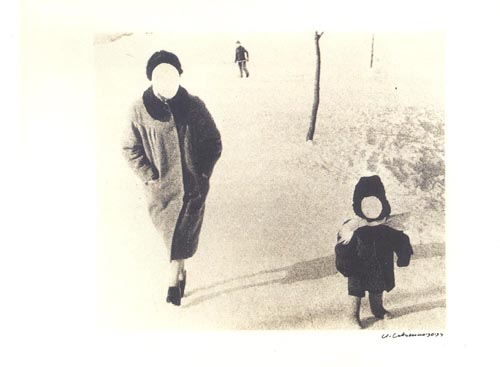Igor Savchenko
dal 11/6/2001 al 25/7/2001
Segnalato da
11/6/2001
Igor Savchenko
Nederlands Foto Instituut, Rotterdam
Photo-search for the new Russian identity. Savchenko is a member of a group artists/photographers searching for a new identity after the collapse of the Soviet-empire at the end of the eighties. Savchenko digs like a ‘photo-rchaeologist’ in old family albums. The photos he finds, are representing values and myths from a time that doesn’t exist anymore. Savchenko re-uses the images by re-photographing them.

Photo Recycling
Photo-search for the new Russian identity
The Nederlands Foto Instituut has on show the work of the Russian Igor
Savchenko. Savchenko is a member of a group artists/photographers searching
for a new identity after the collapse of the Soviet-empire at the end of the
eighties. Savchenko digs like a ‘photo-archaeologist’ in old family albums.
The photos he finds, are representing values and myths from a time that
doesn’t exist anymore.
Savchenko re-uses the images by re-photographing
them. He then works on certain details and fragments of the photos, for
instance a face or a hand, and doing this he emphasizes in a manner their
emotional value. New meanings arise, just as a ‘psychological space' for new
identities arises.
When the Soviet empire began to slowly cave in at the end of the 1980s and
early 1990s, it created an historical, cultural and political vacuum in
which questions of both national and personal identity became increasingly
important.
The old bureaucratic culture, in which the official document in
the form of a text or image played a large role in upholding the state
ideology, had reached the end of the line.
In this period a number of
artists and photographers found a means of interrogating and reinterpreting
"official" history on the basis of old photographs, including family photos.
Among them were Boris Michailov, Alexei Shulgin, Vladimir Kuprianov and Igor
Savchenko.
The critical way in which they dealt with the "documentary"
quality of photography has, on the one side, a conceptual character.
At the
same time their work is a search for an alternative account of history in
which personal and individual experience and memories, previously suppressed
by the regime, were once again given space. Work of Savchenko was previous
on show as a part of the Foto Biënnale Rotterdam 2000 (Photo Biennial
Rotterdam 2000).
Savchenko (b. 1962) lives and works in Minsk, Byelorussia. During those
years he began to rephotograph old family photos.
In doing so he sometimes
focused on specific, entirely individual elements in the photographs, such
as hands or faces, which he then reworked by, for instance, overpainting
them. Other times he left the photographs otherwise unaltered, but withheld
all information about the origin of the image or the identity of the persons
depicted in it.
In this manner he created possibilities for looking at these
photographs in a very personal, sometimes even sentimental manner.
Savchenko's way of working - rephotographing old photographs from someone
else - can be seen as a form of resistance against the authority of
documentary photography, a sort of "counter-documentary."
As the art
historian Olga Kopenkina writes in the catalogue, his work is therefore
rather about the process of forgetting and about loss of memory than about
remembering, with which photography is generally associated.
To accompany the exhibition, Gallery NoName is publishing a catalogue of
Igor Savchenko's work, with photographs and texts, including that of the art
historian Olga Kopenkina, and by Savchenko himself.
A survey of the work of Savchenko is on show under the title The picture
behind him at NoName gallery (till July 15) and at http://wwh.nsys.by/savchenko.
NoName, Hoogstraat 32, Rotterdam, +31 (0)10 413 70 73.
Open Tue till Sun 11 a.m. - 5 p.m.
Entry Dfl 5 CJP Dfl 3,50, Rotterdampass free
Nederlands Foto Instituut
Witte de Withstraat 63
Rotterdam



